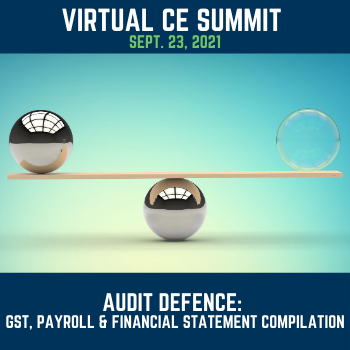Last updated: July 21 2021
Audits of CEWS Claims: Overview

Marco Iampieri B.A., JD, M.B.A.
The Canadian government responded to the Covid-19 pandemic by offering Canadian business access to emergency funds through the Canada Emergency Wage Subsidy (CEWS), which helps with up to 75% of eligible remuneration paid by employers that have suffered a decline in revenue during the pandemic. The CRA reports that there have been over 3,878,970 approved applications with a total dollar value of subsidies approved of over $86 billion. Business owners and the tax professionals working with them should be prepared for CRA audits that will ask for proof of eligibility. Here’s what you need to know:
Audits by the CRA
If a client has been audited by the CRA for CEWS the client must be prepared to demonstrate and provide the CRA documents proving that the client has experienced the appropriate decline in revenue and that the client qualifies for the CEWS– the onus is on the taxpayer to show the taxpayer qualifies for each period.
There are currently 20 CEWS periods. The taxpayer should have documents referencing pre and post Covid-19 revenue streams for each period prior to audit. The taxpayer should also have an explanation regarding how Covid-19 and the governmental measures imposed prompted a decline in revenue for the respective taxpayer. The taxpayer should have documents referencing their employment agreements, the employee activity, and any change in employment relationship impacting the employer’s liability to pay wages.
Frequently asked questions including an overview of the CEWS process, eligibility, calculating revenues, eligible employees, eligible remuneration, calculating the wage subsidy and ensuring  compliance are found on the CRA’s website.
compliance are found on the CRA’s website.
CEWS Legislation
The COVID-19 wage subsidy legislation is found under the Canadian Federal Income Tax Act (“ITA”) at subsection 125.7(2). Subsection 125.7 and 248(1) of the ITA provides definitions for the wording in subsection 125.7(2) that is contrary to the ordinary usage of certain wording within the provision/s.
Disputing a CEWS Determination
The CRA auditor during the assessment of whether a taxpayer qualifies for CEWS in a qualifying period, may determine the amount deemed by subsection 125.7(2) to be an overpayment, and send a notice of the determination to the taxpayer under subsection 152(3.4).
The rules applicable to the normal assessment period or limitation period within the ITA are also applicable to CEWS determinations. For individuals and Canadian controlled private corporations, (as defined in the ITA) the CRA must issue a notice of determination within the three years between the original notice of assessment and the CEWS notice of determination.
An exception is where the individual or Canadian controlled private corporation makes a misrepresentation that is attributable to neglect, carelessness or wilful default or has committed any fraud in filing the return or in supplying any information under the ITA.
In order to dispute a CEWS Determination, the taxpayer must file a notice of objection to the notice of determination within 90 days of receiving the notice of determination. This will allow the taxpayer to internally appeal at the CRA appeals division.
After 90 days of sending the notice of objection to the notice of determination, the taxpayer can appeal to the Tax Court of Canada. A taxpayer should contact a tax lawyer to discuss whether their file would be more expediently and efficiently processed at the Tax Court of Canada, and weigh their appeal options.
Key Takeaways
Tax and financial advisors should be proactive in letting their business owner clients know about the documentation requirements on a CEWS audit. Contact a tax lawyer if there are penalty provisions or limitation period issues during an audit with the CRA. A CEWS audit is a period-by-period audit. Many taxpayers may be issued a notice of determination for some periods, but not for others.
Organize sufficient documentation evidencing your qualification for CEWS prior to providing documents to the auditor – provide the sufficient documentation evidencing your qualification for CEWS as a package, rather than part and parcel. A tax lawyer may provide guidance with respect to responding to a CEWS information request and ensure that the package you submit aligns with applicable CEWS legislation.
Additional educational resources: Be sure to enrol in the September 23 CE Summit to discuss these matters with Marco as well as taking in GST, financial statement and payroll audit-proofing tips and traps. Early registration ends September 15.
Check out the full agenda and enrol here.
